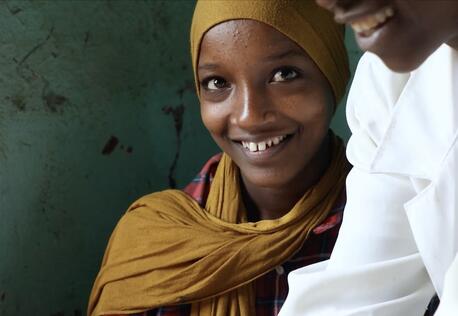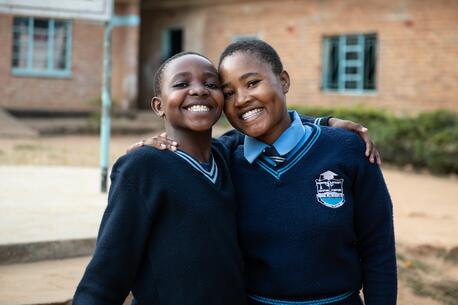
Yemen Is a "Living Hell for Children"
Ravaged by years of civil war, Yemen is on the brink of social collapse. UNICEF and partners have been on the ground since the conflict began in 2015, providing urgently needed medical care, nutrition, safe drinking water, child protection, education and sanitation and hygiene facilities. You can help vulnerable children in Yemen by donating today.
Three years after brutal conflict began in Yemen, almost 80 percent of the population (22.2 million people) is in dire need of humanitarian assistance. Some 18.5 million people are food insecure, and an estimated 16 million people do not have safe, clean water, sanitation or hygiene facilities. More than 2 million children are out of school. The health system is in tatters. Ports and airports are blocked, obstructing delivery of essential supplies. Nearly every single child in the country needs humanitarian assistance.
It is the largest and most complex humanitarian crisis in the world. And it is entirely man-made.
"Yemen today is a living hell for children," says Geert Cappelaere, UNICEF Regional Director for the Middle East and North Africa (pictured above). "A living hell not just for 50 to 60 percent of children. It is a living hell for every single boy and girl in Yemen."
The plummeting value of the Yemeni riyal has doubled the price of food and tripled the cost of fuel since 2015. Families are desperate to feed their children. Half of Yemeni children under the age 5 are chronically malnourished and will never develop to their full intellectual potential. Some 400,000 of these young children are suffering from a life-threatening form of severe malnutrition. Without urgent humanitarian aid, they will not survive.
UNICEF and partners are working around the clock in Yemen to save children suffering from malnutrition and disease. From January to September 2018, more than 170,000 children with severe acute malnutrition were admitted to therapeutic care and more than 997,000 children under the age of 5 received primary health care.
With UNICEF's support, 4.2 million children have been vaccinated against polio and more than 5 million people have safe, clean water to drink. To help children who are out of school, UNICEF has set up education services for 164,000 students and distributed 42,000 school bags filled with basic learning supplies so children can continue their educations.
Adults are responsible for the destruction and suffering in Yemen, but it is children who are paying the ultimate price.
Please help UNICEF save and protect Yemen's children. There's no time to lose.
Top photo: A potential famine is looming in Yemen. In Sanaa, 9-month-old Yahya is one of many suffering from malnutrition. UNICEF is working with partners around-the-clock to provide nutrition and health care for the nation's most vulnerable children. © UNICEF/UN0253363/ Huwais
HOW TO HELP
There are many ways to make a difference
War, famine, poverty, natural disasters — threats to the world's children keep coming. But UNICEF won't stop working to keep children healthy and safe.
UNICEF works in over 190 countries and territories — more places than any other children's organization. UNICEF has the world's largest humanitarian warehouse and, when disaster strikes, can get supplies almost anywhere within 72 hours. Constantly innovating, always advocating for a better world for children, UNICEF works to ensure that every child can grow up healthy, educated, protected and respected.
Would you like to help give all children the opportunity to reach their full potential? There are many ways to get involved.





